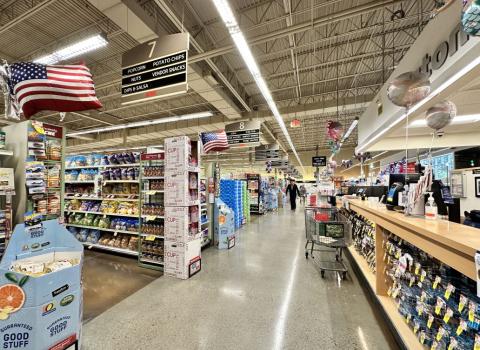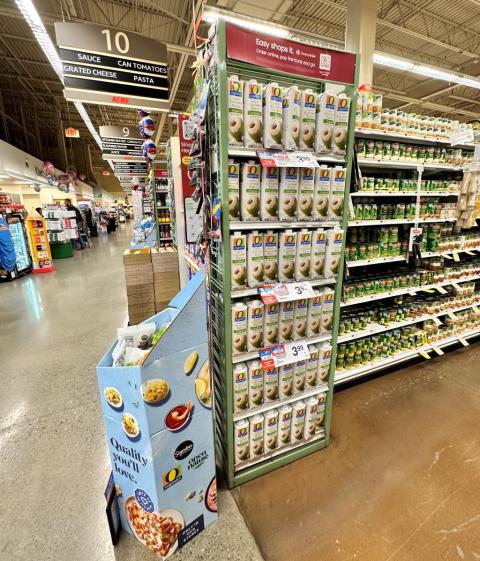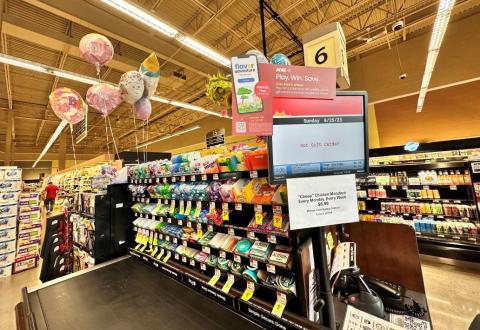Retailer Deep Dive: Albertsons’ Way Forward
Will it close?
That’s the question on the minds of everyone in the grocery industry these days when it comes to Albertsons Cos. and its pending, increasingly controversial merger with The Kroger Co. that is scheduled to close early next year but is contingent on regulatory approval, among other factors. No one can predict the future, but Albertsons thinks it can keep driving sustained sales growth no matter what happens in January. The retailer has made several announcements recently regarding private label and retail media that strengthen its positioning on creating value for shoppers and shareholders.
Customers for Life
When Albertsons reported fourth-quarter and full-year earnings in April, the company gave an update on its Customers for Life transformation strategy, which it launched in 2022. The operator of more than 2,000 stores in the United States embarked on a five-pronged strategy designed to place the customer at the center of everything that it does, with the ultimate goal of supporting customers every day, every week and for a lifetime.
The multifaceted strategy includes digitally connecting and engaging customers through the mobile app and website so that they can enjoy curated experiences in e-commerce, the community, loyalty, health and media; differentiating the store experience by deepening engagement using technology, and removing associate pain points to allow employees to focus on customer service versus just tasks; elevating the retailer’s distinctiveness in fresh by expanding private-brand products and services, and enhancing product offerings in center store to address customers’ changing needs and preferences; modernizing capabilities through an improved supply chain, enhanced data and data analytics, and ongoing productivity, all built on the foundation of being locally great and nationally strong; and further embedding environmental, social and governance (ESG) throughout operations.

CEO Vivek Sankaran credited the strategy for the retailer’s strong financial report for its fourth quarter and fiscal 2022. For the fourth quarter, Albertsons’ net sales and other revenue was $18.3 billion, compared with $17.4 billion year over year. The increase was driven by a 5.6% increase in identical sales, spurred on by retail price inflation, growth in pharmacy and increasing digital penetration. Also in Q4, digital sales increased 16%; loyalty members increased 15% to more than 34 million; net income was $311 million, or 54 cents per share; and adjusted EBITDA came to $1,050 million. Gross margin rate decreased year over year to 27.8% from 28.7%, with the pharmacy business and decrease in COVID-19 vaccinations driving approximately half of the rate decrease.
In fiscal 2022, Albertsons saw same-store sales increase 6.9%, digital sales increase 28% and an adjusted EBITDA of $4,677 million. Net income was $1,514 million, or $2.27 per share, and adjusted net income was $1,965 million, or $3.37 per share.
The company reported capital expenditures of $2,153.9 million in fiscal 2022, including investments in digital and technology platforms, 173 store remodels, and the opening of five new stores.
While Sankaran believes that the grocer is well positioned for top-line growth in fiscal 2023, he’s anticipating an uncertain, and possibly challenging, economic backdrop.
“We have prepared our business for a more difficult consumer environment, and are expecting significant labor investments and inflationary cost increases,” Sankaran said. “Additionally, we expect further declines in COVID-19 vaccination and at-home test kit revenue. These headwinds are expected to be partially offset by the ongoing growth in our core business and the benefits from the next phase of our productivity initiatives.”
Meanwhile, Albertsons has been busy reimagining its private-brand portfolio as inflation-battered consumers increasingly switch to private brands.

Private-Brand Consolidation
In May, Albertsons said it would consolidate three of its Signature private brands under a single master brand, Signature SELECT, which will feature a new logo and packaging design. The transition from Signature Farms, Signature Care and Signature Café is currently underway at Albertsons, Safeway, Vons, Jewel-Osco, Shaw’s and more, and is expected to be complete in early 2024.
The transition was apparent during a recent visit to an Acme Supermarket in Hopewell Junction, N.Y. New signage with the updated logo design was all over the perimeter and center store, with a particular emphasis in the produce department.
“Signature SELECT is our flagship brand offering shoppers an incomparable assortment of quality products at an incredible value,” said Jennifer Saenz, EVP and chief merchandising officer at Albertsons Cos., at the time that the brand consolidation was made public. “We are incredibly proud of our Signature family of brands, and by bringing these sub-brands together under one name, we are building greater brand recognition, driving brand loyalty and creating customers for life.”
Signature SELECT is already the largest brand in the company’s Own Brands portfolio boasting more than 8,000 products, including packaged salads, ice cream, frozen pizza, coffee, paper goods, pasta, snacks, and canned vegetables and fruit, as well as ground beef, pork and chicken.
Following the consolidation of Signature Farms’ fresh poultry and produce, Signature Café’s deli items, and Signature Care’s line of personal and baby products, the master brand will feature the modern Signature SELECT logo with a unified package design across a broad assortment of product categories so shoppers can easily identify the brand throughout the store. To reinforce the quality associated with every item, Signature SELECT guarantees 100% customer satisfaction or they can receive a full refund of the purchase price.
The Signature family of brands was introduced to Albertsons’ portfolio of stores in 2016, following the merger of Albertsons and Safeway. However, the ‘S’ branding dates back as far as the 1960s, when Safeway sold various products under the ‘S’ brand, among them milk, bread, ice cream, coffee, jellies, soft drinks, lunch meat, canned fruits and vegetables, frozen foods, and paper products. The ‘S’ brand remained a key private label for Safeway until 2012, when the company retired its namesake brand and merged its products under the Safeway Kitchens, Safeway Farms, Safeway Home and Safeway Care brands, which ultimately became the Signature family of brands.
The Signature SELECT consolidation and rebranding follow recent updates to the company’s Own Brands portfolio, including the evolution of the O Organics brand and the redesign of Open Nature. A recent survey commissioned by Albertsons Cos. revealed that consumer demand for private labels continues to grow, with 93% of Americans embracing and expanding their purchases of store brands. Respondents cited price, quality and availability as the main drivers of these purchases, with a large number writing in that better taste was a factor when choosing a private brand.
To celebrate Signature SELECT, the company debuted a new summer campaign appearing now in print, social, online and streaming channels. From family cookouts, backyard brunches and summer treats to countless other occasions, the creative highlights in-the-moment imagery of how Signature SELECT elevates everyday life with convenient, affordable alternatives to national brands in every aisle — without sacrificing taste or quality.
“When developing the marketing campaign to accompany our expanded Signature SELECT flagship brand, we knew we wanted to celebrate the brand’s virtues of quality, taste, value and convenience,” said Brandon Brown, SVP of Own Brands at Albertsons Cos. “Our Signature creative showcases warm, welcoming scenes that put the Signature SELECT brand at the center of life’s moments. We’re creating an emotional connection with our customer and showing her how everyday occasions can have their own signature flavor and style.”

Retail Media Framework
In addition to private brands, another major focus for Albertsons going forward will be retail media, a business that the company says is a priority for growth.
When Albertsons launched its retail media network (RMN) in 2021 — the Albertsons Media Collective — it was clear that growing the business was a top priority for the company. Retail media networks are slated to bring in $106 billion in U.S. ad spending by 2027, according to eMarketer estimates. That’s more than double the $45 billion expected in 2023.
Since 2021, the Albertsons Media Collective has teamed up with Omnicom Media Group, a partnership that aims to allow marketers to improve targeting and measuring based on ROI in connected TV environments. This past June, the Albertsons Media Collective unveiled a new initiative to establish common standards and best practices when it comes to retail media, publishing a whitepaper detailing why this is crucial to the growth of retail media.
“There is one substantial shortcoming that runs across the hundreds of companies that offer RMNs: There are no universal best practices,” the whitepaper noted. “Without standards to follow, each RMN has its own requirements and processes in areas such as ad formats and measurement protocols. In addition, retailers’ closed ecosystems (known as ‘walled gardens’) and lack of transparency in measurement methodologies further exacerbate the situation. The result is an unnecessarily inefficient, costly and frustrating ecosystem for ad buyers. … It’s critical for RMNs to meet marketer needs to truly capitalize on the potential for growth. During these uncertain economic times, companies are scrutinizing ad spending and deciding where to make cuts. In addition, many marketers and ad buying agencies have reduced staff, further fueling the need for effective, efficient systems.”
To remedy these issues, the Albertsons Media Collective has spearheaded the creation of a framework to drive standardization across the retail media landscape. These standards aim to enable competitive differentiation among RMNs while creating a common baseline to foster greater synergy, efficiency and growth for all.
“One of the things we’re hearing loud and clear from our clients is that it’s too complicated for every one of us to have our own little walled garden and our own unique platform that they have to go to in order to transact,” said Kristi Argyilan, Albertsons’ SVP of retail media. Argyilan and her team have put forth a call to action for retail media stakeholders to join their initiative.
The Retail Media Standardization Framework concentrates on four high-priority areas: product characteristics, performance measurement, third-party verification and capabilities. The overarching goal is to standardize specifications, methodologies, terminology and disclosures across RMNs. The framework draft incorporates insights from advertisers, agencies and other RMNs, and will evolve based on feedback and continued innovation in the marketplace. Every aspect will be pressure-tested for feasibility and adjusted as necessary.
“To ensure the survival of this industry, we must come together toward a greater goal,” Argyilan added. “We believe this framework will serve as a starting point for creating a unified approach to retail media standardization. Setting a new gold standard is the first steppingstone to revolutionizing how advertisers, agencies and retail media networks work together.”
It’s clear that Albertsons is trying to build a strong retail media business, something that was likely extremely appealing to Kroger when it revealed its impending acquisition of Albertsons last year. No matter what happens with the merger in January, however, Albertsons’ work on retail media and private brands will offer a profit accelerator for the company for years to come.
Source: Progressive Grocer




